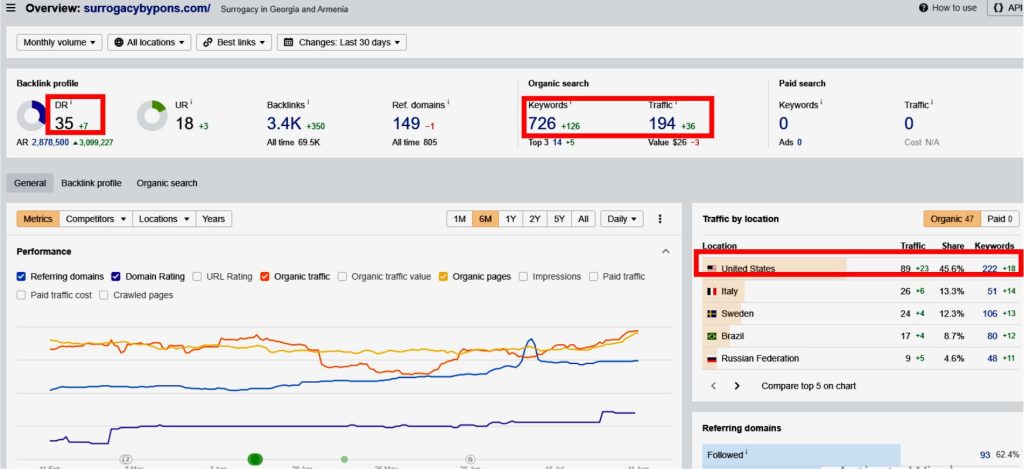B2B Business SEO Case Study – 5 Golden Rules
Learn powerful SEO techniques tailored for SurrogacyBypons, covering everything from effective keyword research, on-page SEO, link-building, and content optimization to the often-overlooked benefits of press releases and citations. The 100% proven method is based on the teachings of the best SEO coach and speaker, SEO Jesus (aka Stewart Vickers).
B2B SEO Case Study: SurrogacyBypons’ Winning Formula for Top Ranking

We explore strategic link-building methods, analytics tools for tracking success, and ways to improve user experience. Additionally, we show you how to calculate ROI on your SEO investment. Discover how to heighten your online presence and achieve measurable success.
Advanced SEO Services for SurrogacyBypons
Advanced SEO services for SurrogacyBypons, the best surrogacy agency in Georgia and Armenia, were fundamental for improving the visibility and performance of the surrogacy business online. Utilize effective strategies tailored to the SurrogacyBypons website to connect with the target audience more effectively, climb up the SERPs, and ultimately boost conversions and profit.
From keyword research to structured data, mastering techniques will contribute to the overall success of the SurrogacyBypons success story.
Keyword Research: 5 Golden Rules
Keyword research is the foundation of any successful on-page SEO strategy, especially for a surrogacy business such as SurrogacyBypons, where understanding user intent is important to connect with potential clients effectively.
First, pinpoint relevant keywords that resonate with the industry.
- Next, analyzing search volume offers insights into how often terms are searched, highlighting the potential audience size.
- Competing keywords must also be evaluated, as understanding the level of competition aids in strategizing how to differentiate one’s services.
- Matching user intent guarantees that the content addresses the needs of potential clients.
- Regularly updating research guarantees staying ahead of trends and adapting to changes within the surrogacy settings.
On-page SEO: 7 Must-DOs
Implementing effective on-page SEO techniques is vital for optimizing the SurrogacyBypons website, each page is structured to provide maximum visibility and relevance to search engines and users alike.
To achieve optimal results, consider seven must-do strategies for on-page SEO:
- Optimize web page title tags: A compelling title tag serves as the first impression in search results, making it fundamental to include relevant keywords while keeping it concise.
- improve meta descriptions: Crafting enticing meta descriptions will improve click-through rates by briefly outlining the page content.
- Utilize header tags: Properly structured header tags (H1, H2, H3) organize content and signal to search engines the importance of various sections.IMPORTANT: use only one H1 – H1 is the mean heading; you do not need more than one, but you must have ONE H1 on each web page and post! We recommend using Chrome extension Detailed SEO Extension to quickly sken every webpage.
- Focus on keyword placement: Strategically placing keywords throughout the content improves relevancy and supports search engine indexing.
- Improve user experience: A user-friendly layout reduces bounce rates and encourages visitors to engage with the content.
- Secure mobile optimization: With the majority of users browsing on mobile devices, a responsive design is important for maintaining accessibility and functionality.
- Optimize images: Properly labeled images with alt text improve both accessibility for users and indexable content for search engines.
What Google Wants: High Quality, UNIQUE and Relevant Content
Google prioritizes high-quality, unique, and relevant content, making it imperative for SurrogacyBypons to produce content that meets the criteria in the worldwide surrogacy market.
A strategic approach will benefit the site’s search rankings. Unique and valuable content will foster trust and establish SurrogacyBypons as an authority in the field. To align with Google’s expectations, consider the following strategies:
- Conduct thorough keyword research to identify terms potential clients are searching for.
- Focus on creating great guides that address common questions and concerns.
- Incorporate visual elements such as infographics to improve user experience.
- Encourage client stories and testimonials to add a personal touch to the website.
Press Releases and Citations: Overlooked Cheap SEO Tools
Press releases and citations will serve as overlooked yet effective tools in improving the SEO strategy for SurrogacyBypons, providing additional visibility and credibility in the highly specialized field of surrogacy.
- When crafting press releases, make them concise and informative, having between 500 and 800 words, while using keywords effectively to improve ranking in SERP.
- Subsequently, gather citations from high-authority directories in the surrogacy and healthcare sectors.
SEO of Existing Content: Google Doesn’t Index Unoptimized Content
Improving the SEO of existing content is important for SurrogacyBypons, as Google often overlooks unoptimized pages, which will hinder the website’s overall performance and visibility in search results.

To provide valuable content, the SEO expert must undertake a total audit. SEO audit assesses the current keywords, updates outdated information, and integrates relevant keywords naturally into the existing text.
Here are the fundamental SEO audit steps:
- Keyword Research: Identify high-traffic keywords associated with surrogacy and family building.
- Content Review: Evaluate the current articles to determine which ones are performing well versus ones needing improvement.
- Text Updates: Refresh content with new statistics, insights, or changes in surrogacy laws.
- SEO Best Practices: Implement best practices by optimizing meta tags, headings, and image alt texts, to create a mobile-friendly experience.
Following steps diligently will support visibility and improve search engine indexing, ultimately attracting more visitors to the site.
Link Building Strategies for SurrogacyBypons
Link building is a rudimentary aspect of SEO that will impact the online presence of SurrogacyBypons. IMPORTANT FACT: without backlinks, your website won’t rank for relevant keywords!
Based on our 20 years of experience, you should implement strategies such as guest posting and Private Blog Networks (PBNs) to improve domain rating DR and ranking in SERP.
Guest Posting on Relevant Websites
Guest posting on relevant websites is a powerful link building strategy for SurrogacyBypons that allows for outreach to potential clients and partners while also establishing authority in the surrogacy field.
To effectively identify suitable websites for guest posting, conduct thorough research. Begin by evaluating the niches of various platforms, confirming they align with the surrogacy domain. Utilize tools such as Google search, social media, and backlink analysis software to discover sites that accept guest contributions. Once potential websites are identified, the next step is crafting effective pitches.
- Focus on highlights that resonate with the audience, such as informative content, insights, examples, manuals, guides, statistical data, prognosis, or case studies.
- Personalize each outreach email, mentioning specific articles or features of the site to demonstrate genuine interest.
- Maintain a concise and engaging writing style that highlights mutual benefits.
The advantages of guest posting extend beyond link building; by sharing valuable content with established audiences, brands improve SEO outcomes and greatly boost visibility and credibility within the surrogacy industry. A dual impact will lead to increased traffic and potential client inquiries, fostering growth and development for all parties.
Link-building Secret Rules for Success (by SEO Jesus)
Some of the knowledge we implemented in building Pons Medical Research’s online success was acquired from the SEO Jesus YouTube channel, specifically from the video How New Sites BEAT Established Titans With Internal Links, Content Silos, and Site Architecture.
DR above 30, Traffic above 5K and Consistency over Years
To achieve successful link-building for SurrogacyBypons, adhering to secret rules such as targeting websites with a Domain Rating (DR) above 30, traffic above 5,000, and maintaining consistency over the years is important.
Engaging in effective link-building strategies requires a nuanced approach, where selecting the appropriate sources is imperative.
When assessing potential link sources, evaluate traffic and Domain Rating and the relevance of content to the surrogacy niche.
- Look for websites that align closely with the core themes of your services.
- Consider the historical performance of links from sources, paying attention to both trustworthiness and user engagement metrics.
The quality of links outweighs quantity; a few authoritative links will boost SEO performance compared to numerous low-quality ones. For sustainable success, implement a long-term strategy that includes regular audits of your link profile and adapting to changing algorithms and trends within the industry.
Utilizing Private Blog Networks (PBNs)
Utilizing Private Blog Networks (PBNs) will provide a strategic advantage for SurrogacyBypons in link building, allowing for more controlled and effective backlinking to improve SEO performance.
When effectively utilized, networks create a reliable source of high-quality backlinks that quite climb up the SERPs. Note that while the potential benefits are substantial, they come with inherent risks, such as penalties from search engines if the guidelines are not followed.
An ongoing commitment to maintaining sites with fresh content and regular updates will boost credibility.
- Benefits: improved visibility, improved SEO ranking, and greater control over backlinks.
- Risks: Potential penalties from search engines and the resource-intensive nature of maintaining multiple sites.
Ultimately, creating a sustainable PBN focuses on careful planning and a keen understanding of best practices to thrive in the competitive environment of SEO.
Analytics and Tracking for SurrogacyBypons: Ahrefs, GA, GSC
Analytics and tracking are fundamental components of any successful SEO strategy for SurrogacyBypons, utilizing tools such as Ahrefs, Google Analytics (GA), and Google Search Console (GSC) to monitor performance and drive improvements in the surrogacy business.
Improving User Experience and Conversion Rate
Improving the user experience (UX) and conversion rates is vital for the success of SurrogacyBypons, as an intuitive and user-friendly website design will influence potential clients’ decisions in the surrogacy business.
Optimizing Website Design and Navigation
Optimizing website design and navigation is important for improving user experience on the SurrogacyBypons site, visitors will easily find the information they need about surrogacy services.
Implementing an intuitive layout allows visitors to move seamlessly through various sections, reducing frustration and fostering engagement. Furthermore,
- prioritizing mobile responsiveness
- means that users will access vital information on any device without difficulty.
- Clear calls-to-action
serve to guide users toward the next steps, be it scheduling a consultation or accessing educational resources. Focusing on user experience improvements, SurrogacyBypons fosters a welcoming environment where potential surrogates and intended parents feel supported and informed throughout the surrogacy process.
Calculating ROI and Proving SEO Success
Calculating ROI and proving SEO success for SurrogacyBypons is fundamental for justifying marketing expenditures and demonstrating the value of effective SEO strategies in the surrogacy business.
Tracking and Measuring Key Metrics
Tracking and measuring key metrics is vital for SurrogacyBypons to evaluate the effectiveness of SEO strategies and make informed decisions for future improvements.
- Conversion rates reveal how well visitors are being engaged, allowing for adjustments to landing pages and user experience.
- Keyword rankings identify which search terms drive traffic, providing guidance on where to focus SEO efforts.
Continuously monitor metrics to refine marketing approach, making data-driven choices that align with overall business objectives.
Calculating ROI from SEO Efforts
Calculating ROI from SEO efforts for SurrogacyBypons assesses how increased visibility and traffic translate into measurable financial outcomes in the surrogacy business.
To effectively evaluate the impact of efforts, one must first identify the metrics that matter. Start by determining the key performance indicators (KPIs) that will act as benchmarks.
Next, assess revenue attribution by tracking which traffic sources lead to client inquiries and successful matches. Along with tracking revenue, compare the costs incurred during the SEO campaign, such as tools employed and content creation expenses, against the gains achieved.
Pons Medical Research invested between $1,000 and $1,500 in SEO for the SurrogacyBypons website. After three to four months,
- traffic from English-speaking countries doubled,
- the number of ranking keywords rose from 100 to over 500,
- conversions tripled.

After converting the first lead into a client, all costs were recouped and then some. Subsequent new clients generated pure profit.
Given that one surrogacy package costs between $30,000 and $55,000 in Georgia and Armenia, and with less than $2,000 invested, calculating the ROI is straightforward.
The Importance of SEO and Business Quality for Online Success
The importance of SEO and business quality is paramount for achieving online success for SurrogacyBypons, as a well-optimized website improves visibility and reflects the overall quality and trustworthiness of the surrogacy business.
How SEO and Business Quality Work Together
SEO and business quality work together synergistically for SurrogacyBypons, as optimizing the website for search engines also improves the user experience, leading to improved client satisfaction and trust in the surrogacy services offered.
In today’s digital age, it is important for the surrogacy market to recognize how two elements intertwine to foster visibility and a reputable online presence. When a potential client searches for surrogacy options, having a website that ranks high on search engines guarantees they encounter the best offerings quickly.
When effective SEO practices are implemented, they contribute to streamlined navigation and informative content, making it easier for users to find the information they need.
For example, businesses that leverage local SEO strategies attract clients specifically looking for specific services in the vicinity. Advanced local SEO:
- Improves visibility in search results
- improves user experience through optimized navigation
- Increases trust and credibility with clients
Consequently, prioritizing SEO isn’t about ranking – it’s a prerequisite for being noticed (indexed) by Google; it acts as a broad improvement of the business’s quality and reputation in any niche and market.
Frequently Asked Questions
What is SurrogacyBypons SEO Case Study?
SurrogacyBypons SEO Case Study is a detailed analysis of the techniques and results used to build online success for SurrogacyBypons, a company that specializes in surrogacy and fertility services.
What are the techniques used in the SurrogacyBypons SEO Case Study?
The techniques used in SurrogacyBypons SEO Case Study include on-page SEO, link building with guest posts and private blog networks (PBNs), analytics with tools such as Ahrefs, GA, and GSC, optimizing for the right keywords, improving existing content for greater online visibility, and implementing user experience (UX) and conversion improvements.
How did SurrogacyBypons achieve online success through SEO?
SurrogacyBypons achieved online success through a combination of effective advanced SEO services. We optimized the website and content for search engines, built quality backlinks, and used data analysis to make informed decisions. SurrogacyBypons increased online visibility and attracted more potential customers.
What is the role of SEO in business quality and success?
SEO plays an important role in the quality and success of a business. Implement effective SEO strategies to improve online presence, attract more targeted traffic, and increase conversions, ultimately leading to improved business quality and success.
How will I calculate the ROI of SEO for my business?
To calculate the ROI of SEO, you need to track key metrics such as website traffic, conversion rates, and sales. Compare the cost of your SEO efforts with the revenue generated to determine the return on investment. Tools such as Google Analytics track and analyze metrics.
Is there proof that SEO benefits my business?
Yes, there is plenty of proof that SEO benefits your business. Numerous case studies and success stories from companies of all sizes have shown the positive impact of SEO on online visibility, traffic, and conversions.
B2B Business SEO Case Study – 5 Golden Rules Read More »















































